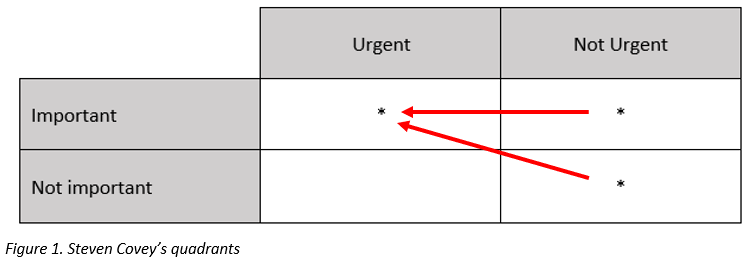
“Furious activity is no substitute for understanding.” - H.H. Williams
Support for momentous effort
Educational organisations are currently in a state of furious activity to change their teaching and learning paradigm, support teachers and maintain student learning. This should be applauded and supported, and it shows the best of humanity as it rises to cope with a crisis. Hopefully, there will be many positives as a consequence of these efforts.
What is actually happening – Peel the paint to look underneath
However, we must ensure that during this momentous effort and working together as a team to overcome a huge obstacle that we also have real understanding of what is happening and see this for what it is.
This is a reaction.
It is a forced response.
It is not a well thought through, long-term plan.
It is not strategic.
It is not visionary.
Changing quadrants
Education has been forced by this crisis to change quadrants – almost instantly. In his pivotal book The seven habits of highly effective people, Steven Covey explains that situations fall into one of the quadrants shown in Figure 1. Many educational organisations have previously placed the need to use technology to enhance learning into the ‘important but not urgent’ or the ‘not urgent and not important’ quadrants. The current coronavirus crisis has forced a sudden change into the ‘important and urgent’ quadrant. However, shifting quadrants requires an associated paradigm shift.
This was something education was not prepared for, but it could have and should have been.

What could have been
Building a comprehensive technology-enhanced learning ecosystem, complete with effective and long-term support of teachers to change to blended, flipped and other types of learning should have been a priority for all educational organisations over the past decade. Every other ‘industry’ has been disrupted and forced to change, yet some parts of education have remained entrenched in past paradigms.
Where has the leadership been? What have they been focussing on? Business as usual? Something ‘easier’?
Define the problem correctly
“If you define the problem correctly, you almost have the solution.” - Steve Jobs
Have we defined the problem correctly? Are we now building a new educational paradigm, or is education simply experiencing a change of locations; business as usual but in the home rather than the classroom?
Is this the next stage of education’s evolution? A ‘new normal’? Or is this just a temporary diversion until things return to where they were before? The ‘old normal’?
Will the technology and techniques required to teach in this new distance-based, distributed situation merge into more traditional practices when the world returns to ‘normal’ and students and teachers can be in the same physical classroom again? Or will the techniques be discarded? Are the techniques education has rushed to worth keeping, or should they be modified or discarded?
Has education suddenly ‘modernised’ to leverage the advantages that technology can provide?
The answers to these questions are very, very important and will shape education in the coming years. Will leaders take note, or will they simply breathe a sigh of relief when this virus has passed, and things return to ‘normal’?
Many questions. Are there answers?
Yet, with all these questions we should be looking for the guiding lights; those educational organisations that have spent years building a comprehensive technology-enhanced teaching and learning ecosystem. This doesn’t just involve hardware and software. It doesn’t involve just creating a rich online learning environment, complete with self-guiding, engaging and resource-rich resources.
It also includes changing the fundamentals of teaching and learning; blended learning in all its forms, including flipped learning and other forms of technology-enhanced learning. This requires years of training and support to implement effectively across an organisation. It involves learning becoming more active and personalised. This change cannot be done in weeks or months.
‘Pie in the sky’ dreaming or a possibility?
Is the nirvana of an online learning ecosystem that can pivot quickly to support the current requirement for distance learning possible, or is this just another daydream?
It is possible. Some organisations have done the groundwork to build a ‘learning ecosystem’ that leverages technology. This ecosystem has a wealth of online resources built around a blended and/or flipped model that have been used in face to face education. Consequently, the changes required to cope with the coronavirus crisis were minimal.
These organisations took years to create the environment, not a few weeks. It required leadership, vision, experience, expertise, long-term commitment, training of staff on different teaching methodologies over a prolonged period, support, understanding and more. It required the ‘right’ infrastructure and eLearning expertise in the face of some who believed the old paradigm worked, so why change anything. It wasn’t easy, but it was worthwhile, and it wasn’t an accident.
Just as a marathon runner who has been training for years is prepared for a race and is competitive, these organisations aren’t panicking and are not looking for a ‘quick win’, ‘low hanging fruit’ or a ‘quick fix’.
They are ‘islands of excellence’ in an ocean of panic.
I was lucky to have led this type of change in my previous role. It was a team effort with many amazing people involved. The benefits of evolving education over many years have produced tangible benefits in the face of the coronavirus crisis, as is shown by some comments by staff at the school.
“…I have the first-class tools to do this remote teaching. My students barely notice the difference. Many actually prefer learning in this mode…”
“…a thank you note for setting me up with the skills I have and are currently employing to do my remote teaching. It was a tough road to blaze but…certainly set (the school) up for success”
“We have the infrastructure backbone, the tools and the culture that was 100% matched to the challenges of this crisis. Collectively as a College we are smashing it out of the park.”
“… has a 10-year history of providing online blended learning. This culture was built through sheer will and vision ... Because the overwhelming majority of College 7 to 12 subjects were already being delivered online through the LMS in the form of media-rich, interactive content, the transition to a total Off-Campus Learning programme in the first term of 2020 only needed the addition of video conferencing to help teachers stay connected with students and provide lesson guidance. Having a stable legacy of curriculum delivery and assessment mechanisms provided a familiarity for students which lightened the cognitive load involved in transitioning to learning from home.”
Every educational organisation is a work in progress, including this one. None is perfect. Yet, this school is very well placed to cope in the current situation and is not a lone case. There are more educational organisations like this.
Leaders of educational organisations would be wise to search out these ‘islands of excellence’ and leverage their experience so that everyone can find additional benefit from this crisis. Our current situation can be a lever to propel education to new heights; leveraging technology while still retaining the ‘human’ aspects of learning and teaching.
It is just a matter of looking, learning and then having the fortitude to ‘really’ evolve education and to never get caught again.
Our students, teachers and parents deserve it.
Peter West currently leads a Learning Technologies Team in a ‘Digital Lab’ that explores new learning technologies for a leading VET organisation. Previously he was Director of eLearning at a very successful independent school on the Gold Coast, Australia. He has been leading educational organisations in all aspects of technology-enhanced learning for over twenty years. He can be contacted at [email protected] and www.linkedin.com/in/peter-west-elearning.


